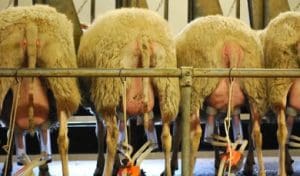
A new report says milking sheep in NZ is a sustainable option.
MILKING sheep could be a more sustainable option than dairy cows for New Zealand farmers, new Lincoln University research has indicated.
Senior lecturer in agribusiness management at Lincoln University Dr Nic Lees and EU Business School masters graduate Isobel Lees co-authored the paper “Competitive advantage through responsible innovation in the New Zealand sheep dairy industry.”
Their case study research found that, rather than competing on cost, the NZ sheep dairy industry should promote sustainability and environmental benefits, and be innovative.
Currently, New Zealand has only about 30,000 sheep milked per annum by six main producers. In comparison, New Zealand has 6.7 million dairy cattle and 29.8 million sheep. New Zealand is a major exporter of sheep meat and a global leader in bovine dairy, which provides an opportunity to adapt these existing resources and capabilities with new innovations in farm systems to establish a competitive sheep dairy industry, the researchers found.
“Future environmental constraints make milking sheep a more sustainable option than milking cows in New Zealand,” Dr Lees said.
Sheep do not have the same nitrogen leaching effect as cows because they have a lower volume of urine. Sheep milk also has three times the whey content of cow milk, which aids digestion. It also has higher calcium and higher vitamin D levels, which aid the regulation of phosphorous and calcium absorption essential for bone mineralisation, the researchers found. Sheep milk also contains different forms of proteins that are unlike the beta-lactoglobulin and alpha S1 casein in cow milk that commonly cause milk allergies and intolerance.
NZ sheep meat and dairy cow success provide an opportunity

Lincoln University’s Dr Nic Lees.
Currently, New Zealand has only about 30,000 sheep milked per annum by six main producers. In comparison, New Zealand has 6.7 million dairy cattle and 29.8 million sheep. It is also a major exporter of sheep meat and a global leader in bovine dairy. The report said the success of sheep meat and bovine dairy industries in New Zealand provide an opportunity to adapt these existing resources and capabilities with new innovations in farm systems to establish a competitive sheep dairy industry.
Dr Lees said there is an opportunity to build on the positive perception of low intensity, pasture-based production systems in New Zealand.
“By emphasising these attributes in marketing, sheep dairy products could obtain market advantage and could potentially gain higher product premiums. At the same time, this would help meet the requirement from stakeholders for environmentally sustainable agricultural production.
“Furthermore, consumers are increasingly looking for foods that align with their personal values, such as environmental sustainability, animal welfare, fair trade and organic production. The industry has the potential to see this not as a compliance cost but as a way to provide a valuable competitive advantage.”
He said it could invest in developing new innovations such as superior sheep milk products for niche sectors like health, infant care and gourmet food.
It is estimated that the demand for sheep milk is growing by 10-20 per cent each year
New Zealand’s largest sheep dairy operation, the Blue River Dairy, has seen a 50 per cent increase in the milk powder price over the last three years.
The research indicated that though there is potential for New Zealand to establish a globally-competitive sheep dairy industry, there is a significant lack of some important resources and capabilities to achieve this
However, for the NZ sheep dairy industry to capitalise on this opportunity it would need to focus on developing some of the lacking threshold resources. This would require overcoming current capital constraints, growing the national flock, genetic improvements for productivity, developing experience and expertise, securing market relationships and achieving industry cooperation and collaboration.
The researchers said the industry would also need to develop its unique resources and capabilities in order to create distinctive competencies that will give the industry a sustainable competitive advantage. These include resources such as the pasture-based production systems that enable environmentally sustainable production and meets consumer’s desires for healthy, natural products.
To read the full research report click here.
Source: Lincoln University.

Dr Lee’s work towards small ruminant milk’s scope is quite appreciable. I want to know something with respect to A1 and A2 perspectives. It would be a contribution to the society if something is done along this line, especially where the world is divided into the two different schools of philosophy ie. A1 or A2 milk.
Full names required in future for reader comments please Daya, as per Sheep Central’s long-standing comments policy: https://www.sheepcentral.com/about-us/sheep-central-comment-policy/ Editor.
I am unable to find any data on the web about Vitamin D content of sheep milk. Many places listing the Vitamin D content in up to 10 milks just say no data for the content in sheep milk.